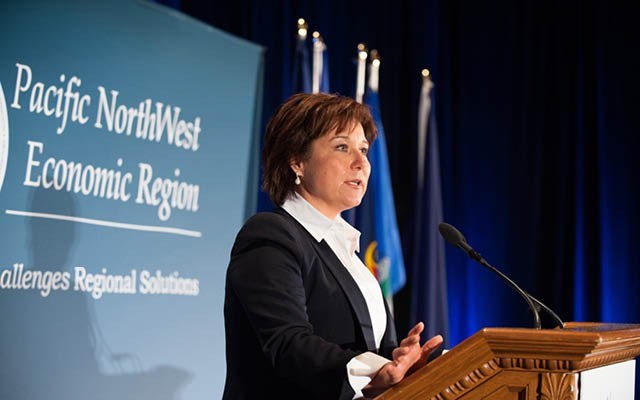Over 500 business leaders, legislators and government officials descended on Whistler this week for the 24th annual Pacific NorthWest Economic Region (PNWER) Summit, anchored by B.C. Premier Christy Clark, whose keynote speech centred around the economic and environmental benefits exporting liquefied natural gas could bring to the region.
Clark spoke on the conference's second day, July 21, to representatives from 10 states, provinces and territories that make up the organization, which is dedicated to furthering the economic well-being and quality of life of the region, and stressed the importance of balancing economic prosperity with environmental responsibility.
"Preserving jobs and economic growth is often seen at odds with preserving this magnificent, beautiful place where we live," she said. "I believe there's a new paradigm that's emerged that allows us to do both at the same time."
Clark went to explain how the way to achieve a "real, sustainable, durable prosperity for future generations" is through focusing on energy security, economic growth, environmental protection and greenhouse gas emission reductions, and touted the creation of LNG plants as an important step towards those goals.
"Now we have the single biggest opportunity we've ever had to reduce greenhouse gas emissions worldwide, and that's by exporting our natural gas by liquefying it over to Asia," she continued. "China is undergoing the biggest transformation in human history; the biggest urbanization ever undertaken, and they want to power that economic growth with natural gas rather than coal."
The Chinese government has a plan in place to increase its dependence on natural gas by four per cent of the country's total energy usage, equal to all of the greenhouse gas produced in B.C. over a year and a half, a move that would have far-reaching impacts on the world's air quality, said Clark.
"Studies have shown that cleaner air in China, means cleaner air here," she said. "It's an incredibly big economy and a small goal like that will have a tremendous impact on greenhouse gases all over the world."
Clark also continued touting the Liberals' plan to build five LNG plants across B.C. by 2020 — including a proposed facility on Howe Sound that has drawn outrage from protesters in Squamish — as a means to build economic prosperity in the province through the creation of an estimated 100,000 jobs over the next 30 years.
"Even just one plant would be the single largest investment in our province's history by the private sector," she said. "But to get there we need to look past politics, we need to decide that we're going to work together."
Clark also recognized the PNWER Summit as an effective opportunity to promote cross-border cooperation and engagement with private sector leaders, and highlight B.C.'s priorities to the region.
On Tuesday, July 22, PNWER's Energy and Environment Working Group announced the launch of a "Roadmap to Net Zero Construction and Deep Energy Retrofits by 2030," a long-term regional plan to collaborate on practices and technologies leading to the construction of net-zero-energy and carbon-neutral buildings in the most cost-effective manner. The plan is meant to provide a pathway for policymakers to make the standards a norm for all new construction by 2030.




